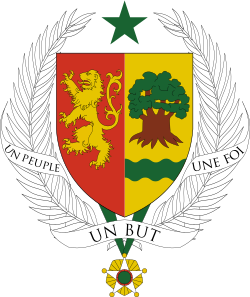 |
|---|
Territorial Assembly elections were held in Senegal on 30 March 1952. [1] The Senegalese Democratic Bloc won 41 of the 50 seats.
 |
|---|
Territorial Assembly elections were held in Senegal on 30 March 1952. [1] The Senegalese Democratic Bloc won 41 of the 50 seats.
Unlike other French colonies in Africa which used a dual college system, with French citizens electing part of the General Council and Africans electing the remainder, the Senegalese General Council was elected on a general roll. [1]
| Party | Votes | % | Seats | |
|---|---|---|---|---|
| Senegalese Democratic Bloc | 224,122 | 70.17 | 41 | |
| French Section of the Workers' International | 95,296 | 29.83 | 9 | |
| Others | 0 | |||
| Total | 319,418 | 100.00 | 50 | |
| Valid votes | 319,418 | 98.27 | ||
| Invalid/blank votes | 5,610 | 1.73 | ||
| Total votes | 325,028 | – | ||
| Registered voters/turnout | 660,655 | 46.20 | ||
| Source: De Benoist | ||||